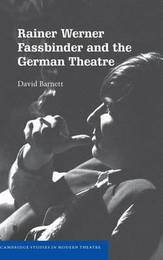
|
Rainer Werner Fassbinder and the German Theatre
Hardback
Main Details
| Title |
Rainer Werner Fassbinder and the German Theatre
|
| Authors and Contributors |
By (author) David Barnett
|
| Series | Cambridge Studies in Modern Theatre |
|---|
| Physical Properties |
| Format:Hardback | | Pages:314 | | Dimensions(mm): Height 229,Width 152 |
|
| Category/Genre | Drama |
|---|
| ISBN/Barcode |
9780521855143
|
| Classifications | Dewey:832.914 |
|---|
| Audience | | Professional & Vocational | |
|---|
| Illustrations |
25 Halftones, unspecified
|
|
Publishing Details |
| Publisher |
Cambridge University Press
|
| Imprint |
Cambridge University Press
|
| Publication Date |
24 November 2005 |
| Publication Country |
United Kingdom
|
Description
Using extensive and untapped archival material as well as a series of in-depth interviews with Fassbinder's main theatre associates, this book offers commentary on and insights into Fassbinder's plays, his dramaturgies and staging practice. David Barnett helps to unlock the much-discussed theatricality of Fassbinder's films by showing its many concrete sources. The first study of Fassbinder's work in the theatre, as a playwright and director, this book gives a full contextualization of his work within the upheavals of its times. Readers are introduced to the cultural history of the West German theatre in the late 1960s and early 1970s. Radicalism in society meets experiment on stage as Fassbinder emerges from the cellar theatre scene of Munich, co-founds the antiteater, and is then integrated into the most subsidized theatre in Europe, before being offered his own theatre to run for one fateful season.
Author Biography
David Barnett is Lecturer in Drama Studies at University College Dublin. He is the author of Literature Versus Theatre, a study of the later plays of Heiner Muller in performance (1998). He has also published widely on contemporary German drama, metatheatre and postdramatic theatre.
Reviews'... fascinating ... Reminded of how Elsaesser's deft treatment of Fassbinder's complex identity reveals that to search for Marx in Fassbinder will yield Freud, David Barnett's book kits out the Fassbinder scholar with a gleaming set of new tools.' Germanistik in Ireland
|